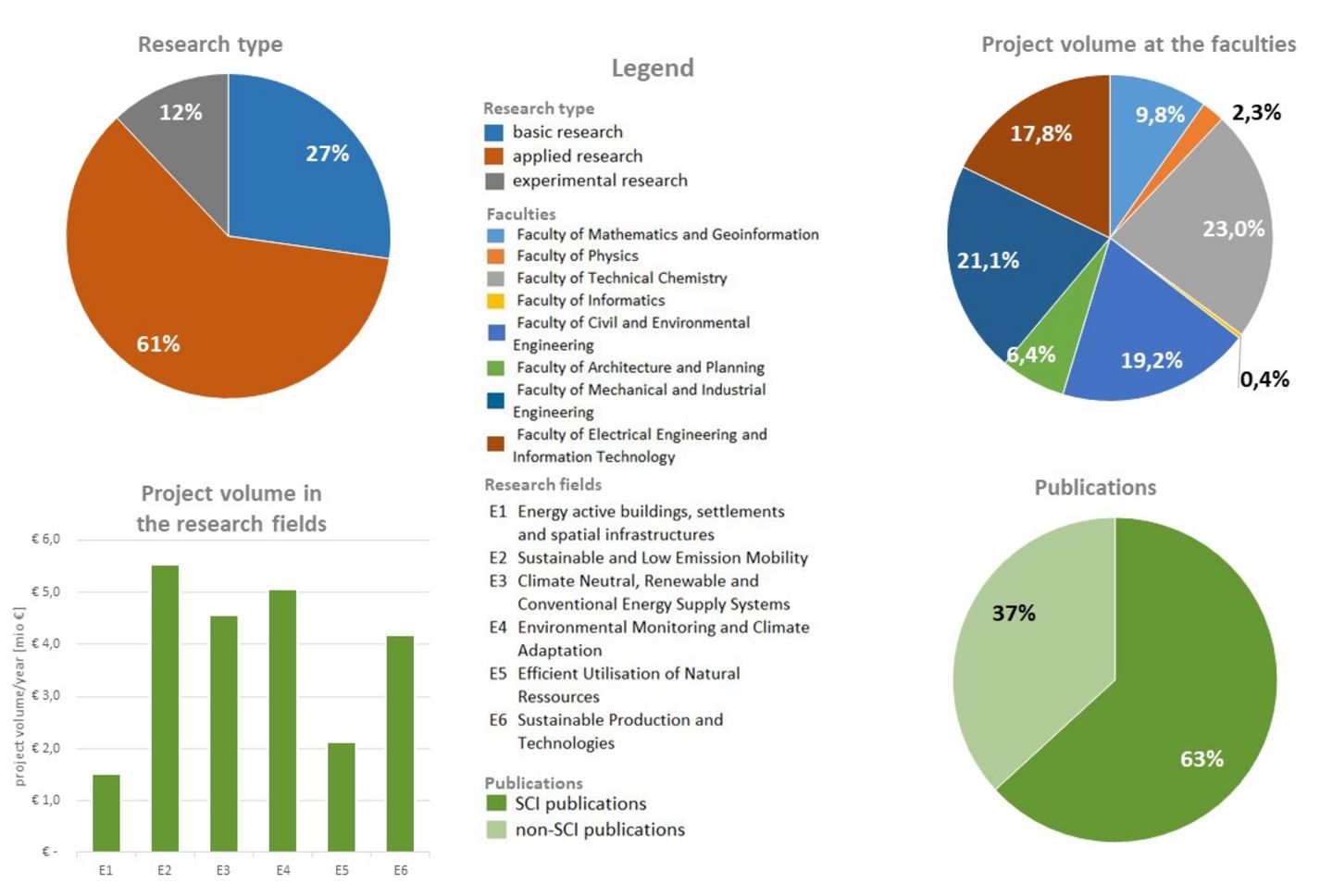Energy and Environment
The research focal area Energy and Environment covers subjects which have a direct influence on all our lives. How can we make sustainable use of our resources? How can we keep our environment clean and help in the fight against climate change? Which technologies can we use or develop to produce energy in an environmentally friendly manner, conserve raw materials and design energy-efficient buildings and transport?
This research focal area is the most interdisciplinary at the TU Wien as the biggest social issues can only be tackled by collaboration between highly different research units – the wide-ranging technological expertise in the field of energy is enhanced by internal academic expertise in the fields of climate, environment, economy and resources.
Research into the green energy of tomorrow
The ever increasing demand for energy affects both the extraction of resources and the climate and environment. Alternative energy sources must be further developed, reliable solutions to climate issues must be found, and there are still some serious problems relating to harmful substances that have not yet been solved. Although significant progress has already been made in these areas, there are still many outstanding questions that are almost impossible to answer using traditional technological approaches.
We need to consider the entire energy conversion chain and technology life cycle with respect to efficiency, costs and environmental effects (holistic solutions!) as well as focus more intently on sustainable technology. Pioneering basic research and applied research related to current practices must make all of these processes easier to understand and helping to protect the environment.
In the future we shall get our electricity from many different energy sources. Our researchers are providing valuable ideas for this – from water power to solar energy. In the field of biomass recovery, TU Wien has received international recognition for many years. The pilot plants in Güssing, developed with TU Wien know-how, have meanwhile achieved a worldwide level of recognition. And yet electricity generation is only part of this: it is just as important to consider possibilities for saving and storing energy. Even the electricity supply grids will look different in the future from the way they do today. If our large power stations are to be replaced by numerous small alternative electricity generators, then we need smart grid networks that can handle them. All these technical ideas must ultimately be considered against an economic and political background.
Technology for the environment
Almost all aspects of our daily lives could be made more environmentally friendly and this begins in the home: TU Wien is involved in energy efficient construction, with new, environmentally friendly building materials and with environmentally friendly building technology. Nor should the sociological aspects be ignored – all the way up to planning ideas for entire towns or regions. Sustainable materials, production processes and technology – mostly in association with digitalisation – can help us save energy and raw materials. In the development of new technical processes, new biotechnologies play a key role, tackling the use of biological systems to generate applications in industry, agriculture, the environment and medicine. New ideas for mobility should reduce our consumption of fossil fuels and create a multi-modal, sustainable and low-emission traffic system. Materials consumption cycles must be closed – waste needs to be viewed not as a harmful burden but as a valuable store of raw materials.
Our researchers are developing environmental analysis methods for investigating, measuring and modelling water, air and soil, whether on site, in the laboratory or using satellite-driven processes. New discoveries arising from investigations of water quality are providing the direct foundation for effective and sustainable measures in the field of water and health. Environmental monitoring, which plays a central role in the area of managing natural risks, is providing us with reliable data on the condition of, and changes in, the environment where new strategies need to be found.
Pioneering basic research and applied research related to current practices are making all of the processes easier to understand, re-develop and helping to protect our environment.
- Energy active buildings, settlements and spatial infrastructures
- Sustainable and low emission mobility
- Climate neutral, renewable and conventional energy supply systems
- Environmental monitoring and climate adaptation
- Efficient utilisation of material resources
- Sustainable production and technologies
Interdisciplinarity is crucial to the success of the research focal area Energy and Environment. It allows for wider-ranging projects, larger project volumes and excellent developments in publications. All eight faculties at TU Wien are represented, around 82% of the institute – with 125 research groups are carrying out targeted research into various aspects of energy and environment.
The third-party funding obtained in 2019-2021 for research projects in energy and environment is approximately EUR 23 million per year (around 430, mainly application-oriented projects). The academic output is reflected in the approximately 375 publications per year.

Breakdown of project volume by share of research types and share of faculties, project volume in the individual research fields, and breakdown of publications
In the research focal area Energy and Environment, 27% basic research, 61% applied research and 12% experimental development is carried out.
The project volume is divided among the faculties as follows: 9.8% Mathematics and Geoinformation, 2.3% Physics, 23.0% Technical Chemistry, 0.4% Informatics, 19.2% Civil and Environmental Engineering, 6.4% Architecture and Planning, 21.1% Mechanical and Industrial Engineering, and 17.8% Electrical Engineering and Information Technology.
The project volume in the individual research fields can be presented as follows: EUR 1.5 million in the research field Energy Active Buildings, Settlements and Spatial Infrastructures, EUR 5.5 million in the research field Sustainable and Low Emission Mobility, EUR 4.5 million in the research field Climate Neutral, Renewable and Conventional Energy Supply Systems, EUR 5.1 million in the research field Environmental Monitoring and Climate Adaptation, EUR 2.1 million in the research field Efficient Utilisation of Natural Ressources, and EUR 4.2 million in the research field Sustainable Production and Technologies.
The publications are divided into 63% SCI publications and 37% non-SCI publications.
- Institute of Energy Systems and Electrical Drives
- Institute of Chemical, Environmental and Bioscience Engineering
- Institute of Powertrains and Automotive Technology
- Department of Geodesy and Geoinformation
- Institute of Water Quality and Resource Management
- Institute of Hydraulic Engineering and Water Resources Management
- Institute of Energy Systems and Thermodynamics
- Institute of Spatial Planning
- Institute of Applied Synthetic Chemistry
- Institute of Architecture and Design
- future.lab - Platform for inter- and transdisciplinary teaching and research in architecture and spatial planning
- Institute of Architectural Sciences
- Institute of Material Technology, Building Physics, and Building Ecology
- Institute of Transportation
- Institute of Urban Design and Landscape Architecture
- Institute of Building- and Industrial Construction
The selection relates to the size of the project volume in the specified period, as well as the proportion of the project volume in the key area of research, the institute project volume, and the proportion of publications.
The "Center of Appropriate Technology Group, opens an external URL in a new window" should also be mentioned.
All data and information provided relates to the research period 2019-2021 (based on the period of the Performance Agreement).
